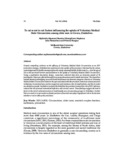Please use this identifier to cite or link to this item:
https://cris.library.msu.ac.zw//handle/11408/1963Full metadata record
| DC Field | Value | Language |
|---|---|---|
| dc.contributor.author | Maseko, Mpikelelo M. | - |
| dc.contributor.author | Maphosa, Sibangilizwe | - |
| dc.contributor.author | Mutambara, Julia | - |
| dc.contributor.author | Bangiza, Witness | - |
| dc.date.accessioned | 2017-05-24T16:51:59Z | - |
| dc.date.available | 2017-05-24T16:51:59Z | - |
| dc.date.issued | 2016 | - |
| dc.identifier.issn | 1815-9036 | - |
| dc.identifier.uri | http://hdl.handle.net/11408/1963 | - |
| dc.description.abstract | Despite compelling evidence on the efficacy of Voluntary Medical Male Circumcision as an HIV prevention strategy, Zimbabwe has experienced a low uptake of the procedure. Informed by the culture centred approach to health communication the study examined beliefs of older men (i.e., over the age of 25) on the perceived barriers and facilitators to the uptake of Voluntary Medical Male Circumcision. Using a qualitative descriptive design, researchers collected data from an intensity sample of 36 participants. Data was collected through focus group discussions and in-depth interviews. The researchers isolated themes by identifying recurrent words and phrases into thematic categories. Barriers to Voluntary Medical Male Circumcision related to the pain associated with the procedure, historical cultural practices of shaming circumcised men, partner suspicions and resistance, fear of complications, and the six weeks sex abstinence period. Facilitators included the belief that the procedure reduced the risk of HIV infection, reduced the risk of sexual transmitted infection, and cervical cancer. These findings suggest the need to factor in the role of cultural practices in traditionally non-circumcising groups in Zimbabwe. Further there is a need to co-opt women as female partners of married men play a significant role in the decision whether or not to take up the procedure. | en_US |
| dc.language.iso | en | en_US |
| dc.publisher | Midlands State University | en_US |
| dc.relation.ispartofseries | The Dyke: A Journal of the Midlands State University;Vol. 10, No. 1: p. 51-70 | - |
| dc.subject | HIV/AIDS, Circumcision, older men, married couples barriers, facilitators, prevention | en_US |
| dc.title | To cut or not to cut: factors influencing the uptake of voluntary medical male circumcision among older men in Gweru, Zimbabwe. | en_US |
| dc.type | Article | en_US |
| item.cerifentitytype | Publications | - |
| item.openairetype | Article | - |
| item.languageiso639-1 | en | - |
| item.grantfulltext | open | - |
| item.fulltext | With Fulltext | - |
| item.openairecristype | http://purl.org/coar/resource_type/c_18cf | - |
| Appears in Collections: | Research Papers | |
Files in This Item:
| File | Description | Size | Format | |
|---|---|---|---|---|
| maseko.pdf | Full Text | 8.05 MB | Adobe PDF |  View/Open |
Page view(s)
146
checked on Oct 19, 2025
Download(s)
38
checked on Oct 19, 2025
Google ScholarTM
Check
Items in MSUIR are protected by copyright, with all rights reserved, unless otherwise indicated.



